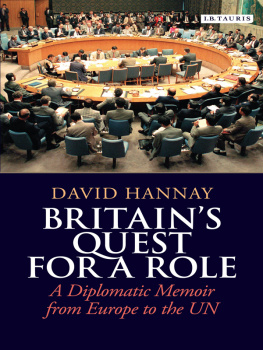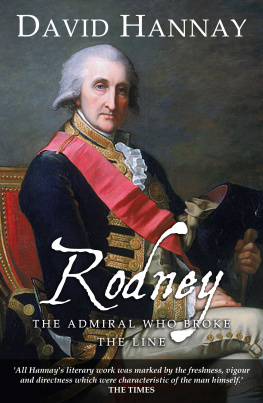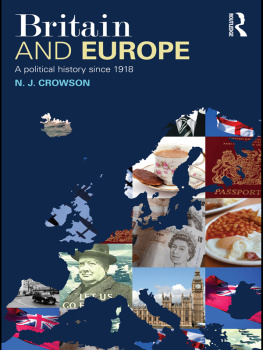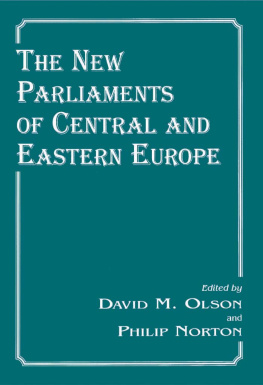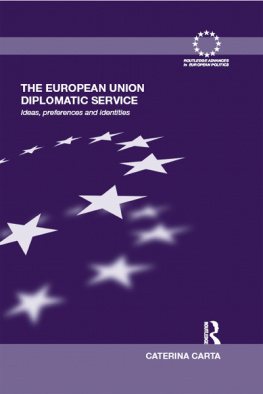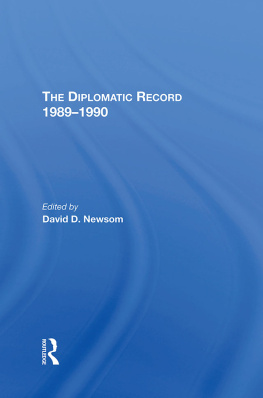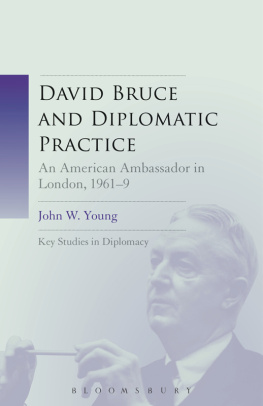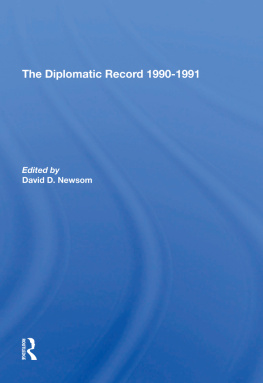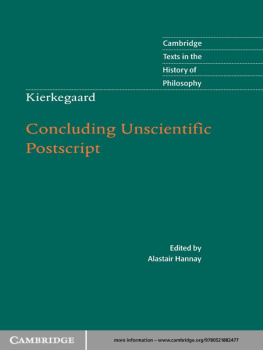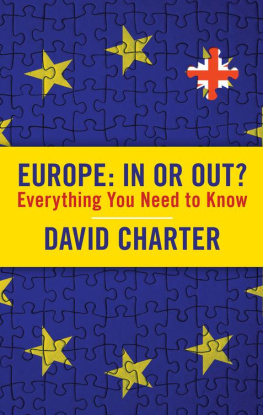David Hannay (Lord Hannay of Chiswick), one of Britains most distinguished Foreign Office veterans, served in a number of key diplomatic posts and has been immersed in the conduct of British foreign policy relating to the UN, Europe and the Middle East over the last half century. He was Minister at the British Embassy in Washington, Ambassador to the European Communities from 1985 to 1990, and Ambassador to the United Nations from 1990 to 1995. Following his retirement from Britains Diplomatic Service, he was the UKs Special Representative for Cyprus from 1996 to 2003. He is a member of the House of Lords European Select Committee. He currently lives in the UK.
British diplomats as a group are a clever bunch. David Hannay is one of the cleverest. It was his, and his countrys, good fortune that his diplomatic career took him from Iran and Afghanistan to Brussels, Washington and the UN. This account of that journey is elegantly framed around the idea of a modern Britain in search of a role. As part of a generation of officials that enabled Britain to punch above its weight, he made the British case from EU accession to the UN Security Council. But the skill of his and his colleagues performance has perhaps allowed their political masters to get away to this day without answering that tricky question about our countrys role in the world.
Lord Malloch-Brown,
Minister of State for Africa 20072009
The real answer to Britains quest for a role in the world is revealed time and again in the life and work of David Hannay and his colleagues so well described in this insightful and highly readable book.
Tom Pickering,
US Ambassador to the United Nations 19891992

Published in 2013 by I.B.Tauris & Co Ltd
6 Salem Road, London W2 4BU
175 Fifth Avenue, New York NY 10010
www.ibtauris.com
Distributed in the United States and Canada Exclusively by Palgrave Macmillan
175 Fifth Avenue, New York NY 10010
Copyright 2013 Lord Hannay of Chiswick
The right of Lord Hannay of Chiswick to be identified as the author of this work has been asserted by the author in accordance with the Copyright, Designs and Patents Act 1988.
All rights reserved. Except for brief quotations in a review, this book, or any part thereof, may not be reproduced, stored in or introduced into a retrieval system, or transmitted, in any form or by any means, electronic, mechanical, photocopying, recording or otherwise, without the prior written permission of the publisher.
ISBN: 978 1 78076 056 8
eISBN: 978 0 85773 272 9
A full CIP record for this book is available from the British Library
A full CIP record is available from the Library of Congress
Library of Congress Catalog Card Number: available
Designed and typeset by 4word Ltd, Bristol
To all those members of Britains Diplomatic Service, their wives and families, who participated in some of these experiences, and to my own wife and family who shared them all.
ILLUSTRATIONS
Great Britain has lost an empire and has not yet found a role.
Quotation from a speech by the US statesman and former Secretary of State Dean Acheson at West Point Military Academy on 5 December 1962
PREFACE
Sometimes a single sentence can sum up a whole, complicated series of historical developments. That, I personally have felt, was the case with Dean Achesons lapidary comment, made not long after this memoir begins, that Britain had lost an empire and not yet found a role. Of course it is a wounding remark, and one only too likely to raise the hackles of those whom it described. But part of a diplomats job is to discount the agreeable things that people say about your government and your country and to take seriously and to try to understand the less agreeable ones.
Looking back over the 50 years covered by this book, from the time I joined the Diplomatic Service soon after the Suez crisis shook Britains diplomacy to its foundations, to the end of the first decade of the present century, it is striking how few fixed points remain. The Soviet Union has gone, and so has apartheid. The Cold War, whose frozen certainties dominated international affairs for so long, is no more. China has emerged from the horrendous convulsions of the Great Leap Forward and the Cultural Revolution to become one of the worlds key players, a rising power par excellence, although by no means the only one. From the extremely modest beginnings of European economic cooperation, European integration has grown into something far more substantial, affecting pretty well every aspect of the public policies of its now 27 member states. Religion, for long discarded as a political factor, has come back with a bang to trouble international relations as it has not done for more than three centuries. Of course, some things have changed less. The United States remains for the time being top dog, the predominant military power in the world, although less able now to get its way than in the recent past. The Arab-Israel dispute remains unresolved, breaking out from time to time into open hostilities and circulating all the time as an insidious poison in the veins of the international body politic. So plenty of stuff has happened, some of it predictable, some of it actually predicted, and much completely unforeseen. It makes sense for those who have travelled through this rapidly changing landscape to set down what they saw and experienced and also to subject their experience to some critical judgements.
I have long hesitated before sitting down to write this memoir. Does the world really need another book of diplomatic memoirs, a genre which many may feel is already oversubscribed and which has a tendency to trivialisation and self-justification? This is a professional memoir, although one written from a personal standpoint and containing a certain amount of personal anecdote. But, as someone who still values what is no doubt regarded by many as old-fashioned reticence and who continues into the WikiLeaks age to defend the need for some discretion in revealing the details of dealings between officials and politicians and the advice they offered to them, I am not setting out to make waves or headlines, rather to cast some light on the complex developments and negotiations in which I have personally been involved. And then, during a life which left little or no opportunity to record these developments at the time, I am relying largely on memory and am courting the criticism of benefitting from hindsight in the judgements I make, although I have included a few contemporary documents which have not yet seen the light of day.
A number of factors have led me to overcome these doubts. My diplomatic career began with three years spent in Iran and Afghanistan, two exceptionally interesting countries, whose recent history and whose current role in world affairs has brought them much closer to centre stage than they have ever as nation states been before, and have made them the object of much, not always particularly well-informed or well-researched, comment. So an account of life in Tehran and Kabul some 50 years ago might contribute to achieving a better sense of perspective. Beyond that part of my career stretches a lengthy, almost unbroken, series of jobs dealing with multilateral organisations, first the Central Treaty Organisation (CENTO), then the European Community which metamorphosed into the European Union, and finally the United Nations. These multilateral organisations (or at least the second and third of them, CENTO is no more) have become an ever more important and more prominent part of the international landscape as the years have passed and have absorbed an ever greater proportion of ministerial and official time and energy. But their operations are not well understood nor, generally, well liked. Many people are put off by the alphabet soup of acronyms, by the obscurity of their decision-making processes and by the complete lack of televisual appeal of even the high points of their evolution. Many commentators do not make much of an effort to fight their way through this thicket of off-putting characteristics and to get to grips with what is really going on and why it is that governments worldwide, whether democratic or authoritarian, whether from developed or developing countries, attach so much importance to their activities. I was struck by the fact that, in a recently published anthology of valedictory despatches from British ambassadors over the last half century, only one out of a total of 91 (yes, I am afraid it was one of mine, although not the one I regard as the better of the two I wrote) was from an ambassador to a multilateral organisation. That surely is a balance that needs redressing.


